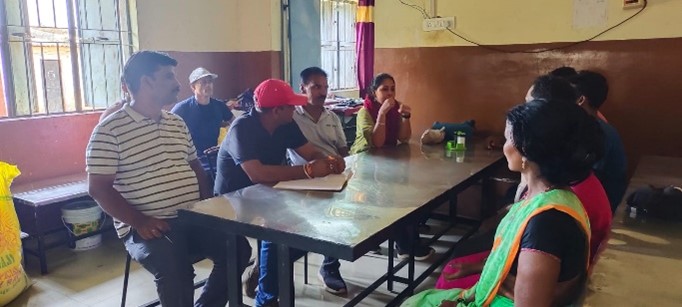(The views expressed in the article below belong to the author and not the OICSD)
In June 2019, Neelima Mishra embarked on a transformative expedition that would change the course of her life and the lives of many in her community. Aanchal Saxena documents her journey as a part of her “Voices of Resilience: Supporting Women Entrepreneurs in Environmental Stewardship” series.
As a participant in the Climate Force Arctic Expedition led by Sir Robert Swan, the first person to walk to both the Poles, Neelima witnessed firsthand the devastating impact of climate change. The sight of plastic waste littering the pristine Arctic landscape deeply moved her, revealing the far-reaching consequences of human actions. This experience ignited a passion in her to address the burgeoning waste problem she saw every day upon returning to Odisha.
Upon her return, Neelima could no longer ignore the widespread waste problem in her city. She was deeply disturbed by the sight of waste burning, people pinching their noses and hurrying past these blighted areas, and waste-pickers, often children, scavenging through trash while animals fed on the litter. These scenes compelled her to take action. In September 2019, she founded Ceiba Green Solutions in Bhubaneswar, named after the Indian red silk cotton tree (Bombax ceiba), locally known as Semul or Indian kapok, which grows abundantly around her home.
Ceiba Green Solutions was established with the vision to provide “Sustainability as a Service” through comprehensive waste management offerings. These include wet waste management, dry waste management, single-use plastics reduction, and training and awareness programs. Neelima’s goal is to reduce the waste sent to landfills and contribute to lowering greenhouse gas emissions, all while empowering local communities, particularly women, to take active roles in sustainability initiatives.


Her work is deeply rooted in the principles of ecofeminism, emphasizing on the interconnectedness of environmental sustainability and women’s empowerment. It’s a journey reflecting commitment to upskilling and empowering more people, thereby bringing diversity to the workforce, especially in the sustainability and waste management sector.
Centring her work at the intersection of waste management, livelihood creation, and innovation, Ceiba actively involves local communities in decision-making processes, understanding that effective waste management must be a collective effort. This philosophy not only addresses environmental issues but also fosters social equity by involving women, who are often the primary handlers of household waste.
Neelima’s path has not been easy. As a sole woman founder, she has faced gender biases and the misconception that a male co-founder is necessary for success. Balancing personal and professional life has also been challenging. However, with strong support from her family and the increasing ecosystem support for women entrepreneurs, she has navigated these hurdles successfully.
Government programs like StartUp Odisha and Atal Incubation Centre (Nalanda Institute of Technology) have been instrumental in providing financial assistance and mentorship, empowering women and transgender entrepreneurs. Moreover, the rise of support networks, incubators, and mentorship programs specifically designed to help women in entrepreneurship, have been crucial in her journey.
With a great emphasis on community-led sustainability, Neelima engages with local communities like residential societies and apartment complexes through awareness and collection drives. Furthermore, women, often the primary waste managers at the household level, are at the forefront of these initiatives. By engaging with women of all ages and encouraging men to participate in waste management activities, Neelima ensures that her projects foster a holistic and inclusive approach to sustainability. This involvement not only empowers women but also instills good waste management practices in children, promoting long-term behavioural change.
One of the highlights of Neelima’s work is the “Recycle Pay” initiative, a clean-tech dry waste management project launched with the support of the British Deputy High Commissioner, Kolkata. This initiative leverages technology to incentivize and streamline the micro-segregation of dry recyclables from residential, commercial, and institutional entities. The Recycle Pay smartphone application offers on-demand, free pickup service using E-Rickshaw, transparent pricing, verified personnel, and instant payments. It also features an “EcoShop” where users can purchase single-use plastic-free products with the money earned from recycling.

Another significant collaboration was with the Accountant General Office, Bhubaneswar, for composting canteen waste. Despite initial resistance and misconceptions about on-site composting, Neelima’s perseverance led to the successful composting of over 1.78 tons of biowaste in four months. This project not only improved waste management practices but also demonstrated sustainability, replicability, and frugality.
With challenges posed by rising population, rapid urbanization, and increasing consumption patterns, her work ensures optimism through inclusive strategies and promotes self-sufficiency within communities. On top of that, Neelima employs strategies that leverage data analytics to gain insights into user behavior, recycling trends, and environmental impact. These insights inform decision-making processes and drive continuous improvement, ensuring that her projects remain effective and impactful.
For women aspiring to become entrepreneurs, her valuable advice is to find opportunities that align with your personal passion and strengths. She firmly believes that while not everyone needs to be an entrepreneur, everyone can make meaningful contributions to various fields. The key is to identify what drives you and use that passion to make a difference.
Neelima’s journey is a powerful testament to the impact one individual can have on their community and the environment. Through her innovative approaches to waste management and her commitment to women empowerment, she has created a model of sustainability that is both inclusive and effective. Her story inspires others to recognize the importance of women leaders in driving positive change and underscores the potential of entrepreneurial initiatives to transform societies for the better.